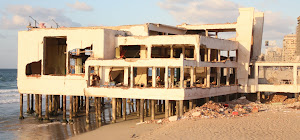ReelShowInt MAG which is a website dedicated to film students and film lovers in general asked me to write an article about my experience in making "Girls' Talk" and in film industry in Egypt because my film was the editor's choice for May. I tried to write what happened during the time when I first had the idea and when the film was done. I also wrote what I feel in general about filmmaking in Egypt. Some may not agree with me but this is how I feel right now :)
Here is what I wrote...
'‘I never really thought that anybody would watch this film while I was making it. It was just an exercise in the independent filmmaking workshop I was attending in the Jesuits Cultural Centerin Alexandria. We were 8 participants in that workshop where each week two of us had to write, shoot and edit two short films only within that week. The rest of the 8 participants were divided to work as a crew for the two films and each week we just switch roles. Other rules were that the films including mine had to be shot in one day and only inside the Jesuits Cultural Center so I really had to come up with an idea that fits these rules.
I was in the ladies room in the American University of Cairo (AUC) when I noticed that there were some writings on the bathroom stall’s door. There were many topics being discussed between the girls in politics, religion, love and everything. Writing on doors of public toilets is very common in Egypt especially in high schools but it was the first time for me to see such thing in an upper class prestigious university like the AUC so I realized that the need of expressing your self and communicating with other people has nothing to do with your social background.
From that day I began to think of “Girls’ Talk” and how two random totally strangers can communicate with one another without knowing or seeing or judging each other.It’s something that might seem old fashioned to some people but we actually do it every day through the internet. I tried to choose two totally different girls who might not get to know each other in normal circumstances.
The film’s budget was theoretically about L.E 3000 which is about $500 but since it was made during the workshop and I had to shoot it inside the building so I didn’t pay anything for renting the place or the Sony Z1 camera or the lighting equipments that i used none of later as the film was shot only with the available light. I did all the editing with “Houda El Soghiar” in Final Cut Pro program in my laptop so I didn’t pay for it either. No one in the cast or the crew was paid as well. The only thing I had to pay for was the ties and one blue shirt for “Radwa”and I borrowed the other one for “Dalia Samir” from my dad. I had also to pay only for a hard paper to paint it and stick it on the door and write on it, so the total actual budget was aboutL.E 100 which is around $20.
Film industry in Egypt is almost the same like anywhere else. You have relatively big budget commercial films and few artistic independent films. Although Alexandria is a city of around 5 million inhabitants the filmmaking or artistic community is relatively small. Though it might seem like a negative point but I think it’s good in a way that you almost know everybody and it happens a lot that you find several projects being made at the same time where for example I might be the editor in one, the DP in another and making my own film as well.
Of course in all or most of the projects you work for free because everybody is working with almost zero budget. There is no place there to teach filmmaking professionally, all of them exist in Cairo so I or any other Alexandrian filmmaker face the pressure of having to move to Cairo at somepoint to have better connections and better chances.
Maybe it’s the least field in Egypt that people care if you are a woman or a man.. but still there are some people who don’t take you seriously at the beginning. I don’t think gender is a problem but maybe being different is.. because some people in the industry just pressure you to dress or talk or even believe like them to accept you as a filmmaker which is something I totally disagree with and I think if somebody doesn’t accept me the way I am then it’s his or her problem not mine.'
Mayye Zayed
June, 2011


 Posted by
Posted by




















0 comments:
Post a Comment